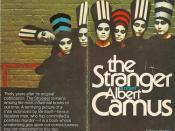In the novel the Stranger, by Albert Camus, the author tried to show the world of an absurd man, Meursault, who's life mattered little, a rebel who himself was bored with life, and who killed an Arab because it did not bother him to kill a man, but because he was there and he bothered him. Camus wrote his Stranger in two parts, presenting Perusal as the existentialist in the first part, a man bored with life, a man with routines, and little feelings for anything or anybody, except sex, cigarettes, and the beach, all physical aspects of life. In the second, Meursault is presented more philosophically, more deeply, as the prisoner condemned to his cell, stripped of all his beloved physical desires and replaced with memories and emotions, things that Meursault was missing in the first part of the novel.
For example, in the first part of the Stranger, Camus wrote in simple and short sentences, like that of a child: "Maman died today.
Or yesterday maybe, I don't know. I got a telegram from the home: Mother deceased. Funeral tomorrow. Faithfully yours. That doesn't mean anything. Maybe it was yesterday."� (Camus 3). There is an absence of complicated grammatical construction, and while Camus describes objects and people, he makes no attempt of analyzing them. He uses words cautiously as if he was somehow suspicious of abstract terms, and his attention is always fixed on the concrete nature of things. He also makes no attempts to analyze love or religion, but reveals his thoughts about them by telling us Meursault's responses. This first part of the novel is written in such a way, because Meursault is in such a child state. Meursault did not care about anything or anybody, but himself, and his own little pleasures and the necessities of the moment. ""æblood red earth spilling over Maman's casket, more people, voices of the village, waiting in front of the cafÃÂé, the instant drone of the motor, and my joy when the bus entered Algiers and I knew I was going to bed and sleep for twelve hours."� (18). He smoked, thought of the beach, and talked of Saturdays spent with Marie, but seldom thought about anything else. His mother died, but all he could think of was the two hour ride to the old people's home in Marengo. Mary told him she loved him, but all Meursault could think of was sex. His boss told him of an offer of advancement to Paris, but all Meursault could think of was how dirty and dull Paris was. Meursault did not think of anything when he was a free man. He seemed to drift endlessly without thought into the burial of his mother, his affair with Marie, his friendship with Raymond, and his comforting of old Salamano. Meursault's head was completely blank of memories and feelings, contrary to his memories and feelings in the later half of the novel.
In the second part of The Stranger, Camus got deeper into Meursault's mind, as Meursault was now imprisoned in a cell, and was stripped of his physical pleasures and necessities. Meursault can be seen going through two stages in his development throughout part two. At first, Merssualt had hope that the trial would go his way, and that soon he would again be able to indulge in his physical pleasures. Although not as blank of emotions and memories as in the first part, Meursault was still trapped in his child-like state. The magistrate wanted Meursault to express regret for his mother's death as well as for his crime, but Meursault refused, and thought that the whole thing is a game, and soon it would be over like his mother's funeral, and he would be able to go home. When the magistrate found out that Meursault did not believe in God, and did not care, he became furious, but gradually gave up on Meursault, calling him an "antichrist"� because Meursault did not care either way. "You see, you see! He said. You do believe, don't you, and you're going to place your trust in Him, aren't you? Obviously, I again said no. He fell back in his chair."� (69). Months go by in Meursault's jail cell, and he soon lost tracks of days, and longs for his physical pleasures. He was stripped off his beloved cigarettes, and so he must quit. Then he started thinking about women and sex, and started fantasizing about all of the women he slept with over the years. Those fanaticizes keep his mind of sex. " "æthat my cell would be filled with their faces and crowded with my desires. In one sense it threw me off balance. But in another, it killed me."� (77). Because he is locked-down in his cell, Meursault cannot also go the beach, his favorite place to relax. To keep his mind off the beach and whatever activities free men could do, Meursault decides to pace around his cell, trying hard to remember all of the things in his bedroom, to the slightest details. Meursault also tried to cope a life inside of a jail cell with a metamorphosis that his mother once told him. ""æI often thought that if I had to live in the trunk of a dead tree, with nothing to do but look up at the sky flowering overhead, little by little I would have gotten used to it."� (77).
Again in the second part of The Stranger we see Meursault in a jail cell after the trial and verdict, except this time he is finally different from the passive and indifferent Meursault we got used to. Here the sentence structure is very long and complex, dealing with Meursault thoughts about his upcoming execution. " Despite my willingness to understand, I just couldn't accept such arrogant certainty."� (109). Before the execution, a chaplain visited Meursault and tried to have him acknowledge his guilt and also the possibility of afterlife, but Meursault refused, still thinking that he might somehow get away from the execution. "And do you rally live with the thought that when you die, you die, and nothing remains? Said the chaplain. Yes, I said."� (117). By morning, before his execution, Meursault finally realized what he couldn't as a free man: that the outside world no longer concerns him. He accepted that his life is meaningless and that the universe is indifferent. ""æI opened myself to the gentle indifference of the world. Finding it so much like myself, so like a brother really, I felt that I had been happy and that I was happy again."� (122-123). He had remained true to himself and to his ideals, and that had allowed him to reach a point of ultimate freedom.
On the whole, Merusault changed during his transformation from a free man to a prisoner. At the beginning of the novel, Meursault was a passive, thoughtless human being, but by the end of his life, locked away in a solitary jail cell, awaiting execution, he became filled with thought and emotions, and finally understood his mother, or put any thought to her death. He wanted to live again, wanted to escape the execution, but knew he could not, and that he must face death and except his death. That was the final transformation from the free Meursault to the imprisoned.





